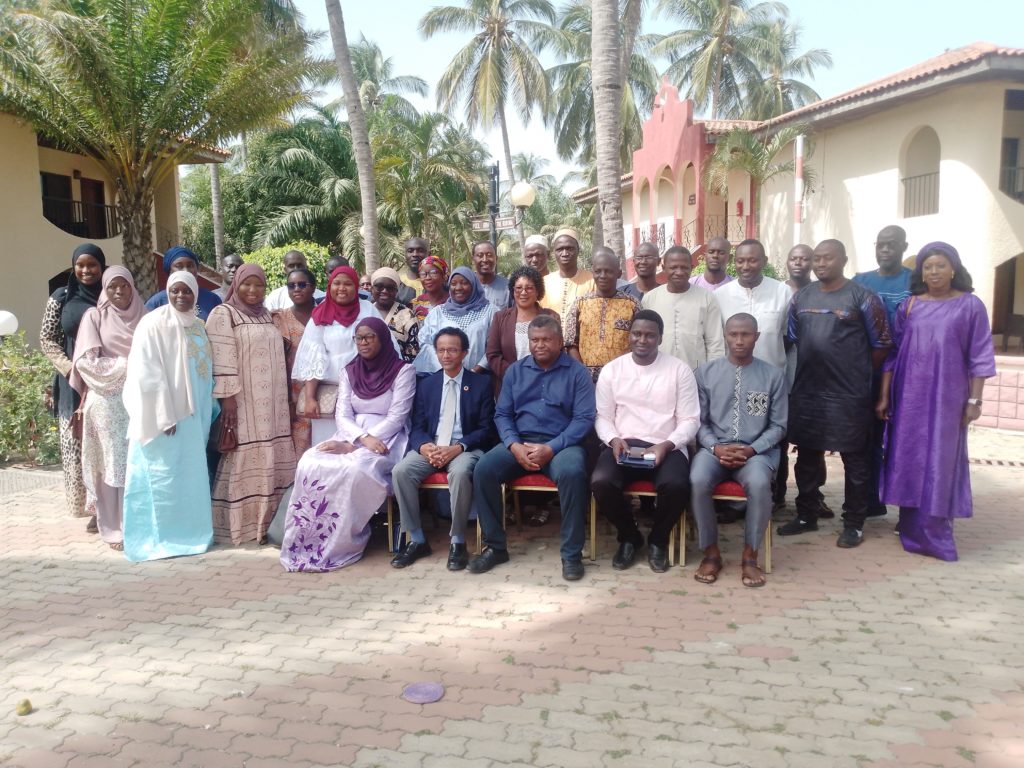Fight Against Cancer: Ministry of Health Validates National Cancer Control Strategic Plan

By Landing Ceesay
Gambia’s Ministry of Health, with crucial support from the World Health Organization (WHO), has taken a major step forward in the battle against cancer. On Friday, at a Local Hotel in Bakau, a comprehensive National Cancer Control Strategic Plan was officially validated, marking a new era of hope and action for the nation.
This strategic plan serves as a comprehensive guide for cancer control and prevention in the Gambia, adopting a multi-faceted approach encompassing prevention, early detection, diagnosis, treatment, and palliative care.
During the validation ceremony, Dr. Ahmadou Lamin Samateh, the Minister of Health, emphasized the profound impact of cancer on the lives of Gambian citizens. He underscored that cancer spares no one, affecting individuals of all ages, genders, and socio-economic backgrounds.
Dr. Samateh highlighted the establishment of the National Cancer Control Program in September 2022, dedicated to enhancing cancer prevention and control and ensuring appropriate treatment for those affected. He characterized the National Cancer Strategy as more than a document, describing it as a roadmap toward a future where cancer is manageable and, where possible, preventable.
“The stories of courage and resilience in the face of this affliction echo through our communities, compelling us to respond with urgency and compassion. It was premised on this that we established the National Cancer Control Program in September 2022, tasked with enhancing cancer prevention and control in the country, and to make sure those who unfortunately come down with the disease receive the appropriate treatment.
“The development of a National Cancer Strategy is a testament to our commitment to providing accessible, affordable, and high-quality healthcare to all Gambians. This strategy is not just a document; it is a roadmap that outlines our collective vision for a future where cancer is not a death sentence but a manageable and, where possible, a preventable condition,” Dr. Samateh said.
Grounded in evidence-based practices and guided by principles of equity and inclusivity, the strategy aims to leave no one behind, providing every Gambian the opportunity for a healthy life free from the shadows of cancer.
Dr. Samateh acknowledged the consultative process involved in drafting the document, engaging stakeholders from the public and private sectors, including doctors, nurses, public health officers, laboratory technicians, academic institutions, civil society organizations, and patient advocates.
Recognizing that the fight against cancer extends beyond the Ministry of Health, Dr. Samateh urged collaboration among all stakeholders, emphasizing that overcoming the challenges posed by cancer requires a collective effort.
“And, even though as MoH we are primarily responsible for the prevention and control of cancer, the fight against cancer goes beyond MoH. There are a number of factors that predispose individuals to cancer, which are outside the purview of our ministry. I therefore urge everyone, all stakeholders, government agencies, non-governmental organizations, healthcare professionals, and the community at large to collaborate closely in the implementation of this strategy. Together, we can overcome the challenges posed by cancer and build a healthier, more resilient nation,” Dr. Samateh said. Dr. Kebba S. Bojang, the Program Manager of the National Cancer Control Program, highlighted the increasing incidence and mortality of cancer in the Gambia. He stressed the need for a comprehensive policy and guidelines for cancer prevention and control, citing uncoordinated activities in health facilities, limited knowledge among healthcare staff and the population, and insufficient research agenda.
“Incidence and mortality due to cancer have been increasing in the Gambia over the years. In 2020, it was estimated that there were, 1035 new cases of cancer. Think about that for a moment; 1035 being diagnosed with cancer newly). In that the same year, 810 died from cancer!! These numbers are telling and should make one take a pause, especially, if you are one of those who still believe cancer is some Western world disease and problem.
“The five main cancers in the general population reported were: Cervical cancer, liver cancer, breast cancer, lung cancer, and prostate cancer. The five main cancers among men were: Liver cancer, Lung cancer, Prostate cancer, non-Hodgkin Lymphoma, and, stomach cancer. Amongst females: Cervix uteri cancer, breast cancer, liver cancer,colorectal cancer, and stomach cancer,” Dr. Bojang stated.
Dr. Bojang emphasized that despite ongoing initiatives aimed at addressing the cancer challenge in the country, it became evident that a comprehensive policy and set of guidelines for both the prevention and control of cancer were lacking.
Furthermore, Dr. Bojang highlighted the existence of disjointed efforts across various health facilities concerning cancer care. He underscored the limited awareness among healthcare personnel and the general population regarding cancer-related matters.
Additionally, Dr. Bojang pointed out the absence of a robust research agenda to steer the nation’s response to cancer and address the significant impact of cancer-related mortality.
“So, it was out of this realization and urgency for need for action, and through the foresight of the Honorable Minister Samateh, that the NCCP was established to actively coordinate with direction and guidance all activities or interventions in cancer control spectrum, with the goal of reducing the burden of cancer (morbidity and mortality)and to improve the quality of life for individuals affected by the disease,” Dr. Bojang said.
Meanwhile, Dr. Desta Tiruneh, World Health Organization (WHO) Representative to the country said noncommunicable diseases (NCDs), including heart disease, stroke, cancer, diabetes, and chronic lung disease, are collectively responsible for 74% of all deaths worldwide.
“Unfortunately, more than three-quarters of all NCD deaths, and 86% of the 17 million people who died prematurely, or before reaching 70 years of age, occur in low- and middle-income countries,” Dr. Tiruneh said.

